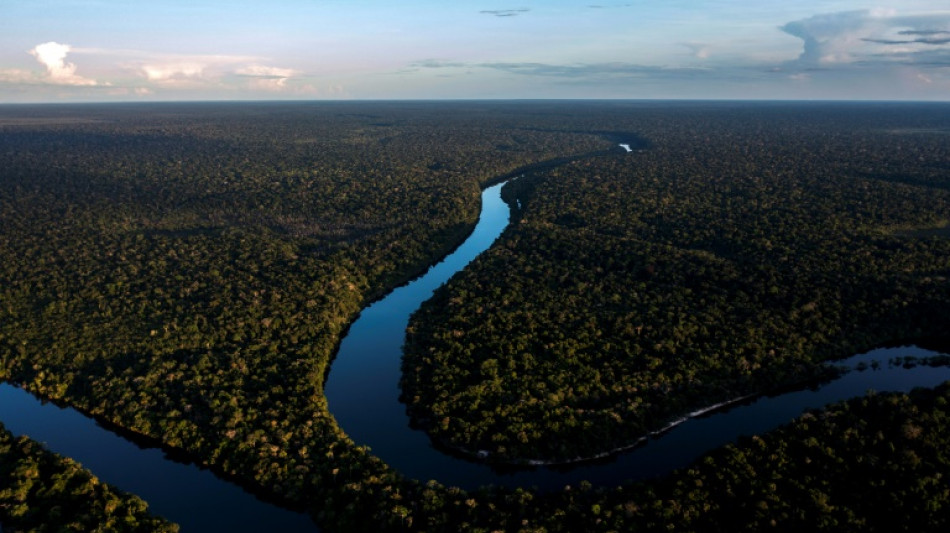
-
 Minorities fear targeted attacks in post-revolution Bangladesh
Minorities fear targeted attacks in post-revolution Bangladesh
-
Tatum's 43-point triple-double propels Celtics over Bulls

-
 Tunisia women herb harvesters struggle with drought and heat
Tunisia women herb harvesters struggle with drought and heat
-
Trump threatens to take back control of Panama Canal

-
 India's architecture fans guard Mumbai's Art Deco past
India's architecture fans guard Mumbai's Art Deco past
-
Secretive game developer codes hit 'Balatro' in Canadian prairie province

-
 Large earthquake hits battered Vanuatu
Large earthquake hits battered Vanuatu
-
Beaten Fury says Usyk got 'Christmas gift' from judges

-
 First Singaporean golfer at Masters hopes 'not be in awe' of heroes
First Singaporean golfer at Masters hopes 'not be in awe' of heroes
-
NFL-best Chiefs beat Texans while Ravens clinch playoff spot

-
 Usyk beats Fury in heavyweight championship rematch
Usyk beats Fury in heavyweight championship rematch
-
Stellantis backtracks on plan to lay off 1,100 at US Jeep plant

-
 Atletico snatch late win at Barca to top La Liga
Atletico snatch late win at Barca to top La Liga
-
Australian teen Konstas ready for Indian pace challenge

-
 Strong quake strikes off battered Vanuatu
Strong quake strikes off battered Vanuatu
-
Tiger Woods and son Charlie share halfway lead in family event

-
 Bath stay out in front in Premiership as Bristol secure record win
Bath stay out in front in Premiership as Bristol secure record win
-
Mahomes shines as NFL-best Chiefs beat Texans to reach 14-1

-
 Suspect in deadly Christmas market attack railed against Islam, Germany
Suspect in deadly Christmas market attack railed against Islam, Germany
-
MLB legend Henderson, career stolen base leader, dead at 65

-
 Albania announces shutdown of TikTok for at least a year
Albania announces shutdown of TikTok for at least a year
-
Villa heap pain on slumping Man City as Arsenal sparkle

-
 Laboured Napoli take top spot in Serie A
Laboured Napoli take top spot in Serie A
-
Schick hits four as Leverkusen close gap to Bayern on sombre weekend

-
 Calls for more safety measures after Croatia school stabbings
Calls for more safety measures after Croatia school stabbings
-
Jesus double lifts Christmas spirits for five-star Arsenal

-
 Frankfurt miss chance to close on Bayern as attack victims remembered
Frankfurt miss chance to close on Bayern as attack victims remembered
-
At least 38 die in bus accident in southeastern Brazil

-
 NBA fines Celtics coach Mazzulla and Nets center Claxton
NBA fines Celtics coach Mazzulla and Nets center Claxton
-
Banned Russian skater Valieva stars at Moscow ice gala

-
 Leading try scorer Maqala takes Bayonne past Vannes in Top 14
Leading try scorer Maqala takes Bayonne past Vannes in Top 14
-
Struggling Southampton appoint Juric as new manager

-
 Villa heap pain on slumping Man City as Forest soar
Villa heap pain on slumping Man City as Forest soar
-
Suspect in deadly Christmas market attack railed against Islam and Germany

-
 Biden signs funding bill to avert government shutdown
Biden signs funding bill to avert government shutdown
-
At least 32 die in bus accident in southeastern Brazil

-
 Freed activist Paul Watson vows to 'end whaling worldwide'
Freed activist Paul Watson vows to 'end whaling worldwide'
-
Chinese ship linked to severed Baltic Sea cables sets sail

-
 Sorrow and fury in German town after Christmas market attack
Sorrow and fury in German town after Christmas market attack
-
Guardiola vows Man City will regain confidence 'sooner or later' after another defeat

-
 Ukraine drone hits Russian high-rise 1,000km from frontline
Ukraine drone hits Russian high-rise 1,000km from frontline
-
Villa beat Man City to deepen Guardiola's pain

-
 'Best ever' Odermatt soars to Val Gardena downhill win
'Best ever' Odermatt soars to Val Gardena downhill win
-
'Perfect start' for ski great Vonn on World Cup return

-
 Germany mourns five killed, hundreds wounded in Christmas market attack
Germany mourns five killed, hundreds wounded in Christmas market attack
-
Odermatt soars to Val Gardena downhill win

-
 Mbappe's adaptation period over: Real Madrid's Ancelotti
Mbappe's adaptation period over: Real Madrid's Ancelotti
-
France's most powerful nuclear reactor finally comes on stream

-
 Scholz mourns 5 killed, hundreds wounded in Christmas market attack
Scholz mourns 5 killed, hundreds wounded in Christmas market attack
-
Ski great Vonn finishes 14th on World Cup return


Can biodiversity credits unlock billions for nature?
For supporters, biodiversity credits could unlock billions in much-needed funding for nature, but critics fear a repeat of scandals that have dogged other financial approaches to protecting the environment.
Paying to safeguard tropical rainforests or compensate for habitat destruction is an area of growing interest, and trading credits in conservation will feature at this month's UN COP16 biodiversity summit in Colombia.
The market in biodiversity credits or certificates -- which monetise activities that claim to protect or restore nature -- is new, unregulated and stalked by fears of "greenwashing".
Backers say credits could financially compensate for ecological harm caused by industry, for example when a mine or road project impacts the surrounding environment.
Businesses could, in theory at least, offset damage by purchasing credits from organisations that support nature and biodiversity through wetland conservation or sustainable rubber production, for example.
Ensuring integrity -- in short, that credits actually do for the environment what they promise -- is an enormous challenge for a sector that has no common international standards to speak of.
The voluntary market in carbon credits stalled after revelations that some of the most widely traded offsets did not reduce heat-warming greenhouse gas emissions as promised.
But at the last biodiversity COP nations agreed to earmark $200 billion a year for nature by 2030, and credits are being seen as one way to raise the cash.
- Gaining traction -
That agreement encouraged nations to promote "innovative schemes" including biodiversity offsets and credits.
Businesses and governments hope that COP16 in Cali -- which starts October 21 and is expected to attract 12,000 attendees -- can boost confidence in biodiversity credits.
The International Advisory Panel on Biodiversity Credits, an independent body supported by the governments of France and Britain, is to present a "global roadmap" for the sector.
It wants to encourage countries to have strong national credit schemes rather than strive for standard rules for international trade, which many admit could be unfeasible.
The Alliance for Biodiversity Credits, backed by the UN, and the World Economic Forum is also looking to promote initiatives at the Cali meet.
Elsewhere, similar proposals are attracting high-profile support.
In September, European Commission president Ursula von der Leyen called for the creation of a "nature credits" market to "reward those who serve our planet", pointing to farmers involved in sustainable agriculture.
Brazilian President Luiz Inacio Lula da Silva has mooted a global fund for rainforest conservation that considers paying countries for areas of forest that are protected or restored.
- Challenges -
Many environment groups are wary, fearing money generated from biodiversity credits will not benefit conservation or indigenous communities living closely with nature.
The idea of "selling nature to save it" has been around for decades and today, companies everywhere proudly display their sustainability commitments in product advertising or annual reports.
But the idea has not gone global, and creating common international rules for the trade of biodiversity credits could prove insurmountable.
Discussions around international standards for the trade of carbon credits -- where companies or countries pay to offset their greenhouse gas emissions -- are far more advanced.
But UN efforts to enshrine a globally-accepted framework has not concluded, and the COP28 in the United Arab Emirates last year ended without agreement on the issue.
This bodes ill for biodiversity credits, which have their own set of unique challenges.
Carbon offsets, for example, are at least based on the same, consistent unit -- a single credit represents one tonne of carbon dioxide either removed from the atmosphere or prevented from entering it.
"For biodiversity, we don't really have a metric," said Alain Karsenty, economist at the French agricultural research organisation CIRAD.
"A credit that would compensate for the destruction of a forest in France with a forest in Gabon would make no sense" because the two are not comparable or interchangeable, he said.
R.Adler--BTB




